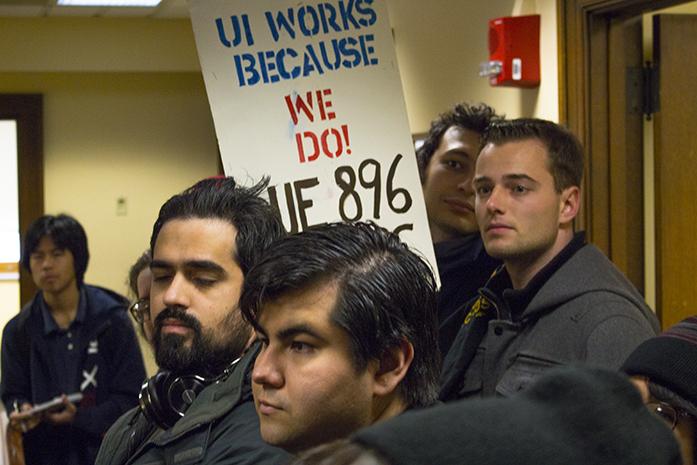Late last week, HF 291 was passed in the state Legislature, stripping public-employee unions of their right to collectively bargain. This means unionized employees such as public teachers and individuals across public-university campuses are no longer allowed to collectively bargain for such items as health care, hours , and overtime pay. Around 1,100 people registered opposition to the bill with only a limited dozen registering in favor. Still, the bill passed, and now, here on campus, the fate of graduate-student benefits remains in the hands of the university.
The Campaign to Organize Graduate Students filed a complaint with the Iowa Public Employment Relations Board alleging bad-faith bargaining in its negotiations for the 2017-19 contract. Representing more than 2,100 graduate students at the University of Iowa, COGS has worked to get the university to guarantee benefits such as health-care and tuition coverage. COGS has asked the University of Iowa in writing twice, once on Jan. 30 and again on Feb. 16, to publicly affirm that “there will be no cuts to graduate workers’ benefits and pay.”
This statement was met with silence.
COGS President Landon Elkind said the new bill allows the university to have control of benefits across many departments. “That means that the university can make cuts,” he said. “And their behavior has given every indication they intend to make cuts.” This is despite the fact that graduate-student workers generate a large profit for the university ranging from $18,000 to $207,000 depending on the number of students being taught.
Students have received no suggestion on whether they will receive any health care, and due to UI President Bruce Harreld’s silence, the absence of health care in their contracts seems like it may be a reality. The Daily Iowan Editorial Board stands with graduate students and firmly believes Harreld and his administration need to act for the good of students and keep graduate students’ health care and benefits safe. Many students rely on the health care the university has provided in the past, and it isn’t reasonable for them to receive it from elsewhere. This puts the students’ future at the university in jeopardy.
Earlier last week, graduate students camped outside Harreld’s office in protest. The purpose was, at minimum, to push Harreld to guarantee their current benefits. He did not respond to the campers and has continued to be silent since. The DI Editorial Board believes the university is able to function because of graduate students and supports the community’s efforts in persuading the state Board of Regents to allow students to keep their health-care and tuition coverage.
Those in the community who support the UI affirming there will be no cuts to graduate-student workers’ benefits and pay are encouraged to express their support to administrators such as Dean John Keller and Harreld. The silence this pressing issue has been met with is unacceptable. There are many who will suffer if their benefits are not secured, and having those people worry for so long is inhumane. An answer is needed.



